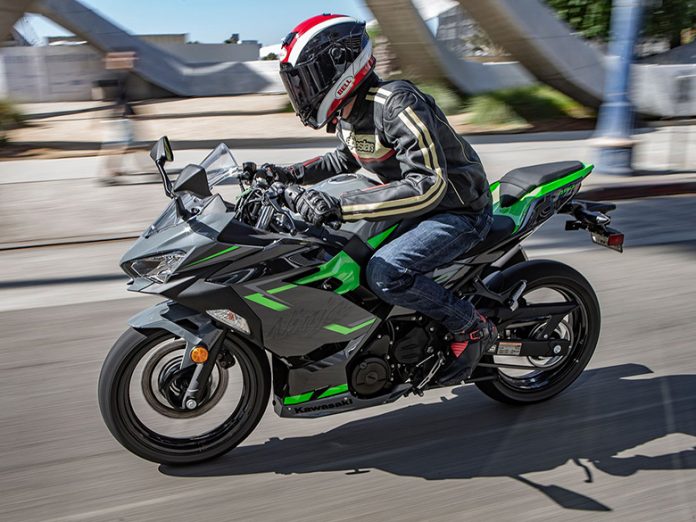The award-winning Ninja® 400 sportbike was designed to appeal to a broad spectrum of riders, enabling them to ride a motorbike that is both thrilling and safe. The tiny, lightweight engine has a class-leading power-to-weight ratio thanks to its efficient design. The power delivery was meant to be smooth and controlled, with enough low-end torque for various riders. The sleek-looking Ninja sportbike appearance complements the new Ninja 400’s performance and handling, intended to attract the attention of even the most seasoned riders. For 2019, the Ninja 400 Kawasaki 2019 Sports Motorcycle is available in Pearl Storm Gray/Metallic Magnetic Dark Gray, Metallic Spark Black, and Candy Persimmon Red/Metallic Magnetic Dark Gray. One can also read the comparison review of the 2019 Kawasaki Ninja 400 vs. 2019 Yamaha FZF-R3.
Ninja 400 Kawasaki 2019 Sports Motorcycle – Features and Price
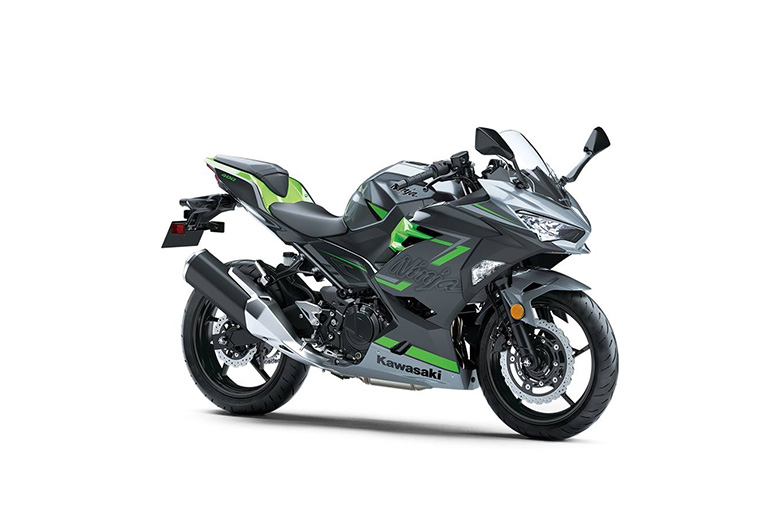
Parallel Twin Engine
Both novice and seasoned riders will like the engine’s rider-friendly demeanor, smooth responsiveness, and plentiful low-end torque. The downdraft intake tract directs intake air into the cylinder via a short, straight route, boosting cylinder filling efficiency and adding to power, particularly at high rpm. The downdraft intake also frees up space behind the seat, constructing it with a shorter reach to the ground. The large airbox aids intake efficiency, resulting in increased power. During acceleration, the airbox design allows the rider to hear the engine’s intake sound more clearly. The intake funnels’ unequal height helps to smooth throttle response by filtering out torque dips. The 32mm throttle valves are oval and have an angled closed position, which aids in rapid throttle response since the valves open quickly after the first valve movement.
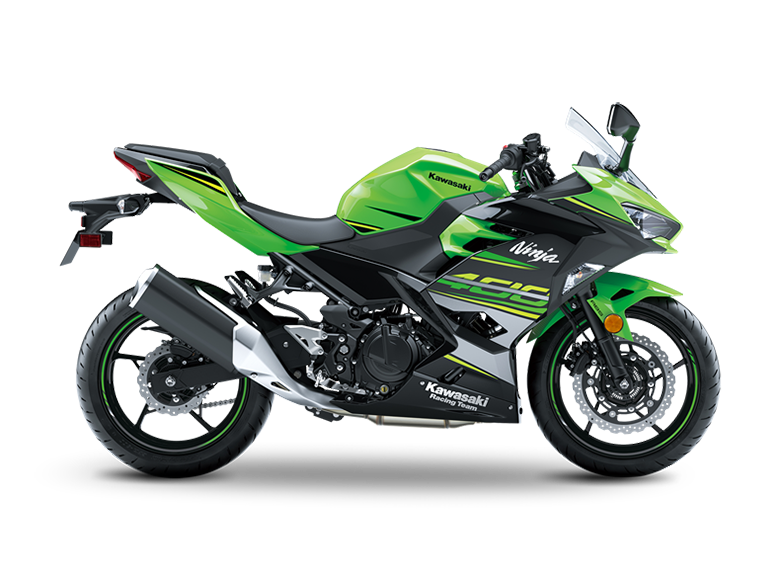
Fine-atomizing injectors placed close to the throttle valves spray fuel directly onto the valves, improving combustion efficiency and allowing for a more linear throttle response. At all engine speeds, the 27.7mm intake and 23.5mm exhaust valves add to performance. Forged camshafts, which usually are only available on larger-displacement engines, help save weight. Oil jets cool the pistons’ undersides, allowing a lighter piston design. The open deck design of the aluminum die-cast cylinder allows for suitable heat dissipation and reduces engine weight. Sleeveless cylinders with plated bores are used. To assist lower total engine height, the cylinder is pushed forward 20 degrees. The engine’s light flywheel allows it to rev fast, giving it a snappy response and an immediate power sense.
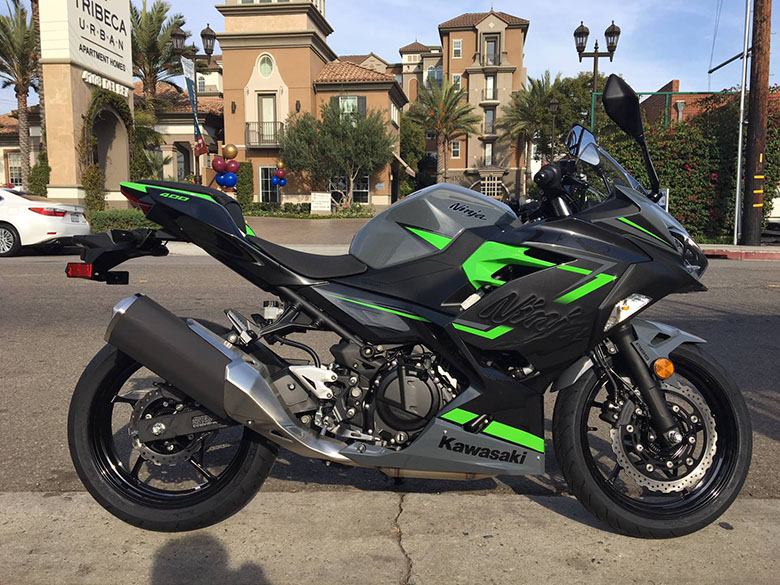
Engine
A machined balancer shaft reduces engine vibration for a smoother ride. The oil pan design enables the exhaust system to follow a straighter path, resulting in weight savings. The performance of large-diameter header pipes is improved over the rpm range. The arrangement of the cooling system reduces the amount of weight and external coolant pipes. When riding in heavy traffic, the radiator fan cover guides hot air out to the sides and away from the rider for enhanced comfort. It also keeps the tank, frame, and other elements that the rider comes into a cooler, which adds to the rider’s comfort.
Transmission/Clutch
The brand new assist and slipper clutch (KP) is small, and its functioning plates aid in lessening lever draw, resulting in a very light lever feel. It’s easier to manage with a broad engagement range. The clutch is pressed together during acceleration (Assist function) using the rotating forces of the clutch hub and pressure plate, allowing for the use of fewer and lighter clutch springs for a softer feel at the lever. The slipper function permits some clutch slippage during high back-torque situations, such as when a low gear is chosen when downshifting, to minimize rear-wheel hop and stall due to engine lock-up. Close gear ratios aid smooth shifting.
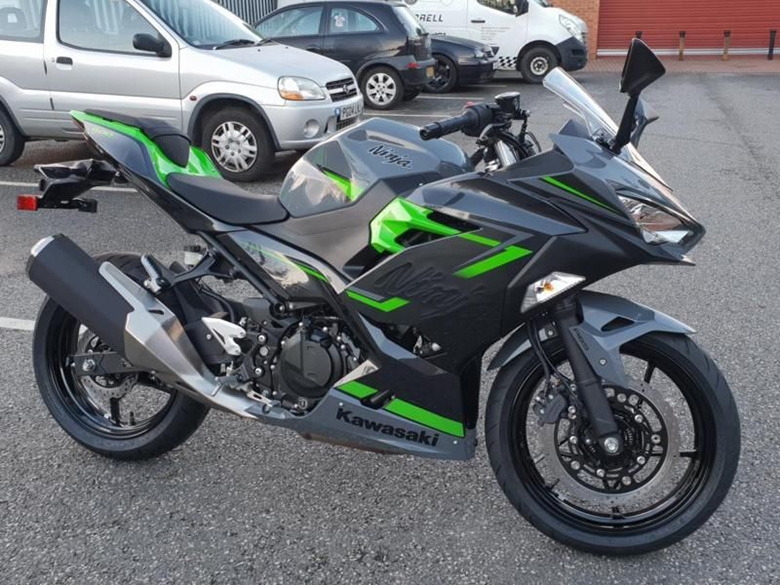
Lightweight Trellis Frame
The design of the Trellis frame is comparable to that of the Ninja H2TM. The structure was designed using Kawasaki’s sophisticated dynamic rigidity analysis to achieve maximum stiffness with the lowest weight, contributing considerably to the bike’s low total curb mass. The small wheelbase and long swingarm of a super sport-style chassis, combined with a sharp steering angle, create light, quick handling.
Suspension
The square-tube swingarm offers stiffness without the need for superfluous gusseting, resulting in weight savings. The ride quality is improved by the Uni-Trak®(KP) rear suspension linkage ratios and shock settings. The 41mm fork delivers stiffness and smooth suspension movement, resulting in more planted front wheel—brakes. A balanced actuation dual-piston caliper grips the large 310mm semi-floating petal front disc. The front brake is the biggest in the class, with the same disc size as the Ninja® ZXTM-14R. For a more positive feel, a rigid front brake master cylinder helps decrease idle stroke. A 220mm rear petal disc is clamped by a rear dual-piston caliper with oversized pistons. The ABS variant is Nissin’s newest small ABS control unit, which aids braking in specific situations.
Wheels/Tires
The stylish star-pattern 5-spoke wheels, comparable to those on the Ninja® 650, generate weight reductions while also improving handling by increasing cornering performance. Radial tires are lightweight, have high traction, and contribute to nimble handling and comfort while riding.
Chassis
The Ninja 400’s large-volume bodywork makes it seem more significant than an entry-level motorcycle and more in line with the Ninja ZXTM-6R/10R. The Ninja H2TM and Ninja ZX-10R’s sharp front cowls and chin spoilers conjure up thoughts of Kawasaki’s supersport flagship Ninja H2TM and Ninja ZX-10R. Slim LED headlights provide the vehicle a more aggressive appearance, are more noticeable to other drivers and deliver more brightness than traditional bulbs. The Ninja 400’s tail cowl has the same triple-peak design as the Ninja H2, emphasizing the Ninja 400’s ancestry. The Ninja 400’s sleek appearance is completed with an LED taillight that looks identical to the Ninja ZX-10R’s.
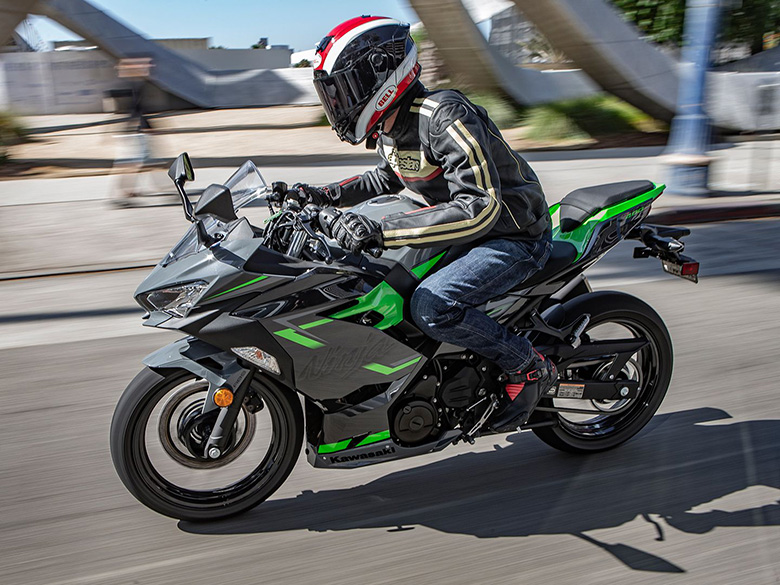
Ergonomics
Riders of all sizes and riding scenarios may benefit from the relaxed riding posture. The Ninja 400’s high handle grip position and somewhat forward footpegs put the rider in a comfortable posture, unlike other rivals with more severe ergonomics. The large-volume bodywork offers excellent wind protection and precise airflow around the rider, which improves comfort. The design also aids in engine heat dissipation via the fairing’s side holes. The seat cushioning is substantial and employs low-rebound urethane for additional comfort, as well as being relatively narrow to allow the rider’s feet to reach the ground more quickly. When it comes to sport riding, super sport-style aluminum footpegs give a direct sensation.
High-Grade Instrumentation
The instrument panel is identical to the Ninja 650, with a big analog tachometer on the left bordered by warning lights and a gear-position indicator, and a multi-function LCD screen on the right. For a sporty, contemporary look, the LCD screen features a negative display—the gear position indicator aids in shifting accuracy and confidence. The odometer, dual trip meters, remaining fuel range, current and average fuel consumption, coolant temperature, clock, and Economical Riding Indicator are other display features. The Economical Riding Indicator looks to imply positive fuel usage, which may assist riders in getting the most mileage out of their rides.
Ninja 400 Kawasaki 2019 Sports Motorcycle – Price
The new Ninja 400 Kawasaki 2019 Sports Bike is available at $4,999 only.
Ninja 400 Kawasaki 2019 Sports Motorcycle – Technical Specifications
Power
| Engine | 4-stroke, 2-cylinder, DOHC, water-cooled |
| Displacement | 399cc |
| Bore x Stroke | 70.0 x 51.8mm |
| Compression Ratio | 11.5:1 |
| Maximum Torque | 28.0 lb-ft @ 8,000 rpm |
| Fuel System | DFI® with 32mm throttle bodies (2) |
| Ignition | TCBI with digital advance |
| Transmission | 6-speed, return shift |
| Final Drive | Sealed Chain |
Performance
| Front Suspension / Wheel Travel | 41mm Telescopic fork/4.7 in |
| Rear Suspension / Wheel Travel | Bottom-link Uni-Trak®, swingarm adjustable preload/5.1 in |
| Front Tire | 110/70×17 |
| Rear Tire | 150/60×17 |
| Front Brakes | 310mm semi-floating single disc |
| Rear Brakes | 220mm single disc |
Details
| Frame Type | Trellis, high-tensile steel |
| Rake/Trail | 24.7°/3.6 in |
| Overall Length | 78.3 in |
| Overall Width | 28.0 in |
| Overall Height | 44.1 in |
| Ground Clearance | 5.5 in |
| Seat Height | 30.9 in |
| Curb Weight | 366.0 lb |
| Fuel Capacity | 3.7 gal |
| Wheelbase | 53.9 in |
| Color Choices | Metallic Spark Black, Candy Persimmon Red/Metallic Magnetic Dark Gray, Pearl Storm Gray/Metallic Magnetic Dark Gray |
| Warranty | 12 Month Limited Warranty |
| Kawasaki Protection Plus™ (optional) | 12, 24, 36, or 48 months |
Conclusion
The new Ninja 400 Kawasaki 2019 Sports Motorcycle is the best and highest performing sports motorcycle with a powerful and high fuel-efficient engine. The bike has got fantastic throttle response and fantastic riding pleasure. The bike is an updated version of the 2018 Kawasaki Ninja 400 with many improvements in its technical and electronics.

